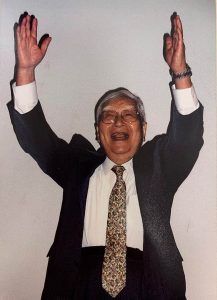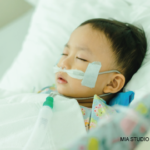“Dr. Kawasaki was a kind, wonderful and generous person who was interested in the welfare of the children and felt he deserved no special credit for describing the syndrome,” says Dr. Lehman. “His only interest was in helping the affected children and those of us doing research with that goal.”
Described by colleagues as delightful, warm, engaging and approachable, Dr. Kawasaki has also been called a “rock star.” He had to have handlers at the International Kawasaki Disease Symposiums, because he was called upon to stop every few steps so young clinicians could take a selfie with him. Dr. Kawasaki was always happy to oblige, even when a trainee, so desperate to get a picture with him, followed him into the men’s room, according to rheumatologist Rae Yeung, MD, professor of pediatrics, immunology and medical science, and a senior scientist at the Hospital for Sick Children, Toronto.
“He never tired of spending time with people, and he never got short with anyone,” Dr. Yeung says. “He was the most lovely, gentle man. Unassuming and yet incredibly knowledgeable and generous with his time—especially with young clinicians.”
Dr. Yeung says she met Dr. Kawasaki for the first time two decades ago and—despite his rock star status—when he would see her every three years at the symposiums, he always remembered her name.
After retiring from his pediatric practice in 1990, Dr. Kawasaki established the Japan Kawasaki Disease Research Center, which he led until last year. “He was a cheerleader for
the entire community working on Kawasaki disease,” Dr. Burns says.
Every three years Dr. Kawasaki and his wife, pediatrician Reiko Kawasaki, MD, attended the International Kawasaki Disease Symposiums together. According to Dr. Yeung, the couple would sit in the front row at each scientific session with blankets over their shoulders and feet and, even in their 90s, remain awake throughout.
“He was really an incredible guy,” Dr. Yeung says. “This is the pediatrician you wanted looking after your child. That’s how I’ll always remember him.”
Dr. Kawasaki was preceded in death by his wife. His survivors include two daughters and a son.
Renée Bacher is a freelance medical writer located Baton Rouge, La.
More about Dr. Kawasaki: Read the Japan Times story that first reported Dr. Kawasaki’s death. Also read this editorial by Physician Editor Phil Seo, MD, MHS, from June 2019: Thinking Big, Thinking Small.



